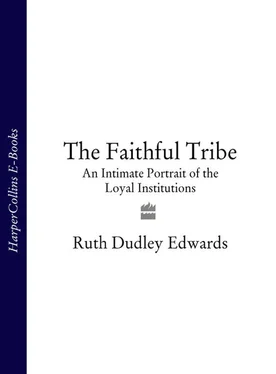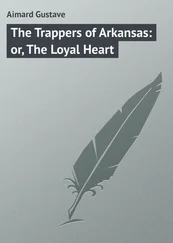CHRIS: There’s an element of father to son, but there would be a lot of people in our lodge whose parents would never have been involved; people who just feel a need to identify themselves. As a kid I always wanted to be an Orangeman, because of what was happening with the bands. I loved the bands. My father was first in the family to be a member of the Orange Order. He joined much to the chagrin of the entire family, who thought it was a lot of crap. There was a sort of a left-wing fundamentalist Protestant element in my family. Grandfather was a Cooneyite; they didn’t even believe in churches. They’re almost like Quakers.
WILLIAM: I joined because some of the folk who were a little older than me that I respected a lot were in the Orange and they were folk who were Christians to begin with. They were folk who were working within the community, part of community life, and I thought, well, they’re older, they’re mature and they believe it’s important and has something to give.
I did it undoubtedly primarily for the sake of history and identity with the Protestant people throughout the generations. My forefathers were in it, my grandfather was in it, certainly I was going to keep the lifeline so to speak. And I stayed with it through thick and thin because I believe that when you look through its qualifications and its principles, if men can live by it, it gives them a good foundation of life and it holds on to principles that society is losing at this stage, like the importance of family life and respect for elders.
If you sit in a lodge meeting and the eighty-nine-year-old speaks, everybody’s quiet and gives him respect and listens. And that isn’t happening generally in society. They tend to separate the young, the middle-aged and the old – even the churches tend to separate them. I think that’s very important.
JOYCE: I was away for a long time and when I came home, because I was now living in a middle-class area, I took this way of reconnecting with the working-class district where I was brought up. An Orange Lodge gave me the chance to show my loyalty to my country and my religion and to be involved socially with my own people.
MICHAEL: I was a bit of a thug when I joined. It was just after the murder of the Scottish soldiers, and I walked round Sheffield with a Rangers scarf tied round me head, a leather jacket and lots of Red Hand badges on the front ready to attack anyone who sounded like a Fenian.
All I’d got culturally was that I was a Prod and we were under attack and we were all supporting each other. So I joined the Orange Order without much of an intellectual agenda. But because I came under the influence of the prayers and the Bible at lodge meetings it reminded me of what I had had as a younger boy. It gave a context for our actions. So I abandoned the physical force idea and started to think more constructively. And the Order did that for me. It did that for a lot of people. It was a restraint on people. This is the Bible. This is your faith. It reminds you that you can’t act in a manner that is inconsistent with the basic principles. You actually think about that.
ALF: I just had an interest in the Orange Order. I thought it was a good institution. There was a lot of brotherly friendship. And you met people in different places and if you were an Orangeman, you were welcome. And I just had a liking to join the Orange Order, because there’s no doubt about it, lived up to, it’s a good institution. There’s no getting away from that.
To Alf, who was ninety when I met him and who had been a member of his lodge for seventy-two years, his involvement with the Orange Order was a matter of the greatest pride. Early in our conversation he pulled out a copy of its Laws and Ordinances and read to me, his voice trembling with emotion:
Basis of the institution: The institution is composed of Protestants, united and resolved to the utmost of their power to support and defend the rightful Sovereign, the Protestant religion, the Laws of the Realm, and the Succession to the Throne in the House of Windsor, BEING PROTESTANT and united further for the defence of their own Persons and Properties, and the maintenance of the Public Peace. It is exclusively an Association of those who are attached to the religion of the Reformation, and will not admit into its brotherhood persons whom an intolerant spirit leads to persecute, injure or upbraid any man on account of his religious opinions. They associate also in honour of KING WILLIAM III, Prince of Orange, whose name they bear, as supporters of his glorious memory.
Alf is one of many Orangemen who cannot see how anyone could find such a statement objectionable; the principle of religious tolerance is for them an imperative. Over and over again people like him spoke to me of the importance of respect for those of different religious persuasions. They talk a lot of ‘decent’ Roman Catholics, by which they mean those who want to live at peace and will not be taking potshots at Protestants from behind hedges, throwing stones at their parades or voting for those who want to drive them off what they would describe as ‘the Queen’s highway’, or force them into a United Ireland.
The etiquette is that you are asked, though obviously you can intimate to an Orangeman that you would like to join his lodge. Your name will be proposed and seconded and there will be a vote: maybe about 10 per cent of people are excluded at that stage. Then, in theory at least, you are vetted: ‘There’s supposed to be a committee in each lodge which should actually check the qualifications and the type of character of a candidate,’ said Martin Smyth, retired Grand Master. ‘I was reading the minutes of my lodge about three years ago and I discovered that when I was proposed, a member of the lodge said: “There’s no need to have a censoring committee on this candidate.” And another brother got up and said this candidate should be treated like everyone else and proposed a censoring committee. That brother was my father. It reflects the type of man he was and perhaps reflects me too. Because I believe that things should be done decently and in order and show no favouritism. And whoever it is be treated equally.’
The 1997 recruitment leaflet puts it succinctly: ‘If you are a practising Protestant in the truly religious sense; regularly at your place of worship, morally upright in your life, and if you display a tolerant spirit towards those with whom you may disagree, then you will be welcome within the Orange instititution.’ Tolerance goes only so far, though. So frightened is the Irish Orange Order still of the wiles of the Church of Rome that it is afraid of converts. There is an unspoken fear that they might be Romish (or, worse, Fenian) Trojan horses. It is therefore difficult, though not impossible, for them to join.
Anyone wishing to join the Orange Order will be told of ‘The Qualifications of an Orangeman’, to which he is expected to live up. ‘The qualifications show what the commission is – what’s expected of people,’ said another Orangeman. ‘And people fall short of what’s expected. They fall short of what’s expected from their respective churches too, but it doesn’t mean to say the whole church is entirely wrong because of that. And the same applies to the Orange institution.’ He was another veteran, and he was as proud as Alf of the principles and language of ‘The Qualifications’ which are crucial to an understanding of the fundamental principles of Orangeism. Recently they were published with an illuminating commentary from the Chaplains’ Committee of the Grand Orange Lodge for study in lodges. I have included here in italics and in brackets a section from the commentary on each part of ‘The Qualifications’. Although rather long and indigestible for those unused to reading scripture, it is worth making the effort to read the whole passage.
Читать дальше












